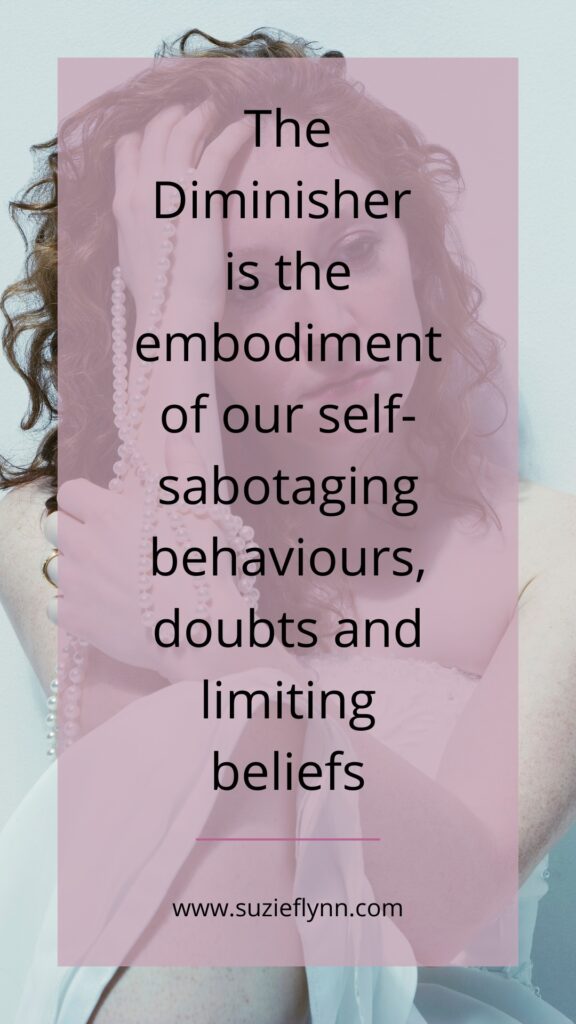This week’s blog is a four part series, where I’ll be helping you recognise how you self-sabotage with your inner saboteur, the Diminisher. Then the best part is, I’ll be sharing strategies for reframing your critical self-talk and how you can advocate for yourself, so you can embrace and celebrate your success.
In this week’s blog we’ll be identifying common ways in which we diminish our success and potential. How to identify the roots of self-doubt with real life relatable examples and what strategies to apply to overcome our self-sabotaging patterns of behaviour
Ready to dive in?
The Diminisher
Before we go any deeper I first must explain to you the term ‘The Diminisher’. In some ways it’s similar to ‘Imposter Syndrome’ but it’s also different as the latter specifically focuses on achievement and success. The Diminisher is a concept that represents how we view and act towards ourselves that undermines our success and potential.
It’s the embodiment of our self-sabotaging behaviours, doubts and limiting beliefs. The Diminisher is the critical inner voice that constantly questions our abilities, downplays our achievements, and amplifies our insecurities.

The Diminisher stems from past experiences, external criticisms and societal pressures over time. In my case it stemmed from my eleven years of childhood bullying and internalising the external criticism I received. As a result I created an identity from these experiences and I became a ‘diminisher’.
We can recognise The Diminisher through various strategies. Including negative self-talk, procrastination, perfectionism and fear-based decision making that hold us back from achieving our goals. The impact of this is that we avoid taking risks, settling for less than we deserve (because we don’t feel worthy) and fail to recognise our achievements. This all feeds The Diminisher.
The good news is that identifying The Diminisher’s voice is the first step in overcoming the challenges it presents. You’ll find that your Diminisher will speak in absolutes i.e. “You’ll never succeed” or in comparisons i.e. “Everyone else is doing better than you”.
Common ways we diminish ourselves
Here are some common ways in which we diminish ourselves…
Downplaying achievements: “It’s not a big deal” or “Anyone could have done it”
Negative self-talk: “I’m not smart enough” or “I’ll probably fail”
Comparing ourselves unfavourably: “Everyone else is doing so much better than me”
Apologising unnecessarily: “Sorry to bother you” when asking a legitimate question
Perfectionism: “If it’s not perfect, it’s not worth doing”
Self-deprecating humour: Consistently making jokes at our own expense
Procrastination: Putting off important tasks due to fear of failure
Avoiding challenges: Not pursuing new opportunities due to self-doubt
Dismissing compliments: “Oh, it was nothing” instead of accepting praise
Setting low expectations: “I probably won’t get it anyway” to avoid disappointment
Recognising these patterns is the first step in overcoming The Diminisher’s influence and embracing our full potential. Which of these do you must resonate with?
Identifying the roots of self-doubt
We can get to the root of our self-doubt that creates these self-sabotaging behaviours that form The Diminisher, when we ask ourselves reflective questions, such as…
1. What beliefs do I hold about success and whether I deserve it?
2. Are these beliefs mine or have I inherited them from a family member, peer or society?
3. Are these beliefs still true and if not can I let them go now?
4. What can I choose to believe instead?

Now let’s look at some real life, relatable examples…
Putting yourself down: When you receive compliments you feel uncomfortable with receiving praise. This was very much me in my teens and twenties, constantly putting myself down. This massively affected my self-worth, confidence and self-belief. The way I started to shift this was to speak up for myself more, change my internal narrative and hold a bigger vision for my life.
Comparison to others: Someone compliments you on the success in your business and your first response is to play it down. Telling them you’re not as successful as other coaches and focusing on the things that arent’ going so well in your business. The way I started to shift this was to stop comparing and swap that for celebrating my success and living every day with an attitude of gratitude.
Perfectionism: You delay launching a service or lead magnet because it’s not “perfect,” and spend more hours tweaking it. The result is you miss out on opportunities for growth and feedback. The way I’ve shifted this is to live by the phrase ‘progress over perfection’ knowing that no action would lead to no results.
Which of these examples do you most resonate with?
Strategies for addressing self-sabotage
The lesson is, not in just understanding how The Diminisher shows up in our life. But understanding the strategies we can use to address self-sabotaging behaviours and overcome The Diminisher’s influence.
These are the top three strategies I’ve used myself to help slay The Diminisher…
Practice self-compassion: Your Diminisher will use it’s critical inner voice to have you question your abilities and downplay your potential and feed your insecurities. That’s why a consistent practice of daily self-compassion is important as it builds a new habit and creates positive change over time. Be kind to yourself and treat yourself how others treat you, with love and kindness.

Set yourself stretch goals: Self-doubt is part of The Diminisher’s arsenal. But when you challenge the norm and dare to believe in your potential you’ll take actions that will give you surprising results. You’ll give yourself permission to dream bigger and you’ll soon discover you’re more capable then your Diminisher allowed you to believe.
Make different decisions: Instead of being afraid to fail and get things wrong, be bold and brave and allow yourself to take risks. Failure is not a reflection of your worth and your ability, it’s merely a learning experience. When I started to make different decisions I took different actions and started to experience more rewarding results in my life.
Implementing these strategies consistently can help us silence The Diminisher and embrace our full potential. Remember, change takes time and patience, but with persistence, it’s possible to overcome self-sabotaging behaviours much faster.
Are you a Diminisher?
I’d love to hear your thoughts and reflections on the role of The Diminisher in your life. Just drop me an email at suzie@suzieflynn.com and let me know if you resonate with The Diminisher. Which aspects of The Dimisher can you relate too? What aha’s or lightbulb moments did this blog create for you?
Follow me on Facebook, Instagram and LinkedIn and stay tuned for the second in this four part blog series, where we will looking at the impact of negative self-talk on success and how we can transform these negative thoughts.
+ show Comments
- Hide Comments
add a comment